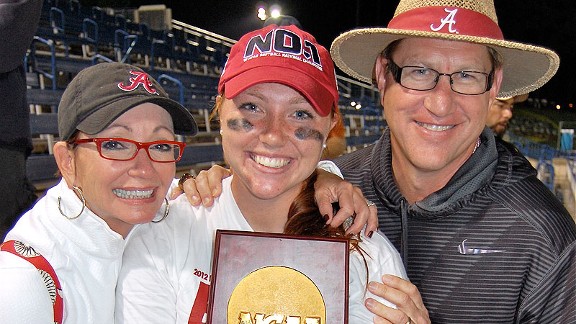
What to Do When Your Child Sits the Bench
Jordan Patterson’s Story
What to do when your child sits the bench. Jordan spent her first two years as the backup catcher for Alabama Softball. She was ready to pay her dues. She showed up every day with a positive attitude, and she worked really hard: Coming in early, staying late, and always looking for those extra reps. She was loved by her teammates and coaches; she treated them well and built strong friendships in those first two years. Most importantly, she enjoyed the experience and was grateful for the opportunity to be a part of something bigger than herself.
Going into her junior season, she knew her time had come. Alabama had won the National Championship in her sophomore season. The players ahead of her had graduated. She had paid her dues. She had earned the starting spot.
Except, her coach did not share the same vision. In the off-season, he recruited another catcher. It didn’t take long for Jordan to realize her coach intended for this talented, new recruit to be their starting catcher.
Now, whether Jordan thought this new girl was a better catcher or not was not really important, and it didn’t matter if her parents thought she had earned it or was more deserving.
The bottom line was this: Her coach thought his new transfer was a better fit as starting catcher.
The Hardest Moment
“Sometimes, you are going to put every ounce of your being into something, and it’s not going to work out exactly the way you wanted it to. You know what? That’s life. Get over it.”
—Jordan Patterson
Your kid is a team player. Well, how do they behave when they don’t get what they want?
It’s easy to be a team player when you see the returns on your investment of time and sacrifice. But, all athletes—regardless of their role—will all face a moment when they will realize they aren’t going to get everything they wanted or worked for: Whether it be playing time, points, or just acknowledgment of their efforts.
An open letter to parents of kids who get a lot of playing time
This is when they will have a choice: ME or the TEAM?
They Aren’t Happy Sitting the Bench
I get it; we want our kids to be happy. When they aren’t happy, they are pretty quick to make sure we know it!
Except, when we step back and look at the bigger picture, we want something more for them than just happiness. We want fulfillment.
I like Brett Ledbetter’s definitions in his book, What Drives Winning: “Happiness: Short-term pleasure. Fulfillment: Satisfaction from developing one’s ability or character.”
When our kids lose a game, miss the big kick, strike out or even sit on the bench all season, it’s hard to be happy. But, in all those situations, every athlete has an opportunity to develop their ability—or, at least, their character. When they sit the bench, they have the opportunity to grow and change the way they respond when they don’t get what they want out of life.
5 Ways to Help Your Kids Embrace Their Role and Keep Fighting
Coaches need every reserve player to do two things:
- Embrace their role.
- Keep fighting.
It’s not an easy task, and parental support is needed to get the players to buy in.
But, quite often, the parents choose to:
- Think the coach is wrong about who should play.
- Believe the coach has favorites and/or just doesn’t like their kid.
- Speak negatively about the coach to their kid, other parents, and/or administrators.
- Make excuses for their child’s lack of effort, ability, and/or poor attitude.
- Resent other kids and/or their parents.
Instead, what coaches need are parents who choose to:
- Believe the coaching staff is making the best decision they can, based on the information they currently have—and they dohave significantly more information than the parents!
- Encourage their child to keep showing up every day and do their best, so they can make a better argument for more playing time.
- Encourage gratitude for the opportunity to be part of the team.
- Reiterate to their children that for the team to be successful, they need to show up and push their teammates in practice.
- Admire and cheer on the other players for their strengths and the effort they have put in.
- Remind them to be ready! They never know when their moment will come!
Jordan’s Choice
“I kept working hard, still came early, and stayed late, but my motivations for doing so began to change. Instead of being motivated by the desire for personal success, I was motivated by the desire for team success.”
—Jordan Patterson
During Jordan’s last two seasons at Alabama, she made the choice to:
- Believe she was part of something bigger than herself.
- Realize the positive impact she could have on others as a reserve.
- Use the experience to shape who she was as a person.
If you ask Jordan, it’s worth it—if you choose to believe it!
In Closing
Jordan’s parental support never wavered. You can listen to her discuss it on my podcast, “Coaching Culture”.
I’ve written previously about how Jalen Hurts’ parents supported him through his benching in college. Read more about it here. Jalen Hurts Story
At certain levels and age groups, leagues and coaches should have certain standards for everyone to get a certain amount of playing time. But, at some level and age, your child is going to have to face the reality of sports.
Notes:
More articles you might enjoy from Ilovetowatchyouplay.com
Understanding the Ripple Effect: How Parents’ Behaviors Impact the Team
My Daughter Quit Sports, and This Is What Youth Sports Parents Need To Know











